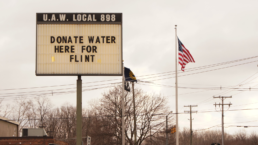A city is forever changed, and so is residents’ relationship with their water. The betrayal of trust by the institutions meant to protect Flint’s residents has made some of them extra cautious as they look to keep themselves and their community safe.
by Anna Clark and Sarahbeth Maney, ProPublica
Flint, Michigan, is less than 70 miles from the Great Lakes, the most abundant fresh water on the face of the planet. It’s laced with creeks and a broad river that bears its name. Yet in 2014, Flint’s drinking water became a threat — not because of scarcity, or a natural disaster, or even a familiar tale of corporate pollution.
Ten years ago this spring, public officials made catastrophic changes in the city’s water source and treatment, then used testing practices that hid dangers. As problems emerged, they failed to appropriately change course. Residents raised repeated concerns about the color, odor and taste of the water but struggled to get a sufficiently serious response, especially from state and federal authorities.

It didn’t help that the distressed city was under the authority of state-appointed emergency managers, an unusually expansive oversight system that residents decried. For a crucial period of about 3 1/2 years, local decision-making was not accountable to voters. The result: excess exposure to toxic lead, bacteria and a disinfection byproduct in Flint’s drinking water. An outbreak of Legionnaires’ disease sickened 90 people and killed 12. (The toll is likely higher, as Frontline documented.) The water, now drawn from the Flint River, wasn’t treated with corrosion control — a violation of federal law — so the pipes deteriorated more every day.
At one point, saying the water damaged its machinery, a General Motors plant switched to another community’s system. Flint’s emergency manager and other officials still insisted that nothing was seriously wrong with the water. But if the water was harming machines, many wondered, what was it doing to people?
Recent Posts
Oman’s Foreign Minister Said US-Iran Deal Was ‘Within Our Reach.’ Then Trump Started Bombing
February 28, 2026
Take Action Now “The Omani FM decided to go public,” suggested one observer, “so that the American people knew that peace was within reach when Trump…
A War With Iran Would Not Be a One-Off Event But a Disastrous Ongoing Rupture
February 26, 2026
Take Action Now If Congress cedes its power to stop a war with Iran, it will fully erode any lingering promise of democratic restraint.By Hanieh…
New Addition to List of Nuclear Near Catastrophes
February 25, 2026
Take Action Now Debris flew for great distances — many times the distance of 270 meters to a nuclear reactor and nuclear storage facility.By David…
Gavin Newsom’s last budget belies his ‘California for All’ pledge
February 24, 2026
Take Action Now Yet, even as the state is poised to lose billions in federal funding, and millions of Californians are losing access to health care…




